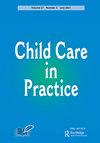Parental Childhood Feeding Experiences and Complementary Feeding Practices in Urban Households of Nigeria
IF 1.4
Q3 FAMILY STUDIES
引用次数: 3
Abstract
ABSTRACT Background Poor complementary feeding practices can expose young children to increased burdens of undernutrition, morbidity, and poor health outcomes in adulthood. Parents and caregivers, who feed the children, are shaped by socio-cultural beliefs and pervasive socioeconomic realities. Also, parental values are influenced by their perceptions and childhood feeding experiences among others. This study, therefore, explored the role of parental childhood feeding experiences and changing socioeconomic realities on complementary feeding practices in urban households of Aba, Nigeria. Method Twenty-eight in-depth interviews and eight focus group discussions were held with parents of young children aged 6–23 months attending postnatal care clinics in selected healthcare facilities in Aba city, Nigeria. Aba city is one of the sprawling urban centers in South-East Nigeria. Data were thematically analyzed using Atlas.ti software. Results Complementary feeding practices in the Aba urban households of South-East Nigeria did not meet the recommended feeding guidelines on timely complementary feeding and dietary diversity. Consumption of processed foods and sweetened beverages was prevalent. Data suggest this feeding pattern was affected by two factors: parental feeding experiences in early life and changing socioeconomic realities. Parents who lacked satisfactory feeding experiences in their childhood but achieved some socioeconomic success in later life exhibited poor complementary feeding practices. Also, certain food types were associated with affluence notwithstanding their nutritional values. Poor complementary feeding was also linked to the parental desire to not reliving their poor childhood feeding experiences. Conclusion The parental perceived poor childhood feeding experience has led many to adopt the consumption of processed foods and sweetened beverages. This may expose children to risks of undernutrition, obesity, and overall poor health outcomes in later adulthood. More effort should be made to educate parents on healthful eating patterns and the dangers of poor complementary feeding practices in children's overall health well-being in later life.尼日利亚城市家庭的父母童年喂养经验和补充喂养做法
背景:不良的辅食做法会使幼儿在成年后营养不良、发病率和健康状况不佳的负担增加。养育儿童的父母和照料者受到社会文化信仰和普遍的社会经济现实的影响。此外,父母的价值观受到他们的观念和童年喂养经历等因素的影响。因此,本研究探讨了父母童年喂养经历和不断变化的社会经济现实对尼日利亚阿巴城市家庭补充喂养做法的作用。方法对尼日利亚阿坝市选定医疗机构产后护理门诊6-23月龄幼儿的家长进行28次深度访谈和8次焦点小组讨论。阿坝市是尼日利亚东南部一个庞大的城市中心。使用Atlas对数据进行主题分析。ti的软件。结果尼日利亚东南部阿巴地区城市家庭的补充喂养方式不符合及时补充喂养和膳食多样性的推荐喂养指南。加工食品和加糖饮料的消费很普遍。数据表明,这种喂养模式受到两个因素的影响:父母早期的喂养经历和不断变化的社会经济现实。在童年时期缺乏令人满意的喂养经历,但在后来的生活中取得了一些社会经济成功的父母表现出较差的补充喂养做法。此外,尽管某些食物具有营养价值,但它们与富裕有关。不良的补充喂养也与父母不愿重温童年不良喂养经历的愿望有关。结论父母认为不良的童年喂养经历导致许多人采用加工食品和加糖饮料的消费。这可能会使儿童在成年后面临营养不良、肥胖和整体健康状况不佳的风险。应作出更多努力,教育父母健康饮食模式和不良补充喂养做法对儿童今后整体健康的危害。
本文章由计算机程序翻译,如有差异,请以英文原文为准。
求助全文
约1分钟内获得全文
求助全文
来源期刊

Child Care in Practice
Nursing-Community and Home Care
CiteScore
3.30
自引率
5.30%
发文量
32
期刊介绍:
Child Care in Practice is a quarterly, peer-reviewed journal that provides an international forum for professionals working in all disciplines in the provision of children’s services, including social work, social care, health care, medicine, psychology, education, the police and probationary services, and solicitors and barristers working in the family law and youth justice sectors. The strategic aims and objectives of the journal are: • To develop the knowledge base of practitioners, managers and other professionals responsible for the delivery of professional child care services. The journal seeks to contribute to the achievement of quality services and the promotion of the highest standards. • To achieve an equity of input from all disciplines working with children. The multi-disciplinary nature of the journal reflects that the key to many successful outcomes in the child care field lies in the close co-operation between different disciplines. • To raise awareness of often-neglected issues such as marginalization of ethnic minorities and problems consequent upon poverty and disability. • To keep abreast of and continue to influence local and international child care practice in response to emerging policy. • To include the views of those who are in receipt of multi-disciplinary child care services. • To welcome submissions on promising practice developments and the findings from new research to highlight the breadth of the work of the journal’s work.
 求助内容:
求助内容: 应助结果提醒方式:
应助结果提醒方式:


